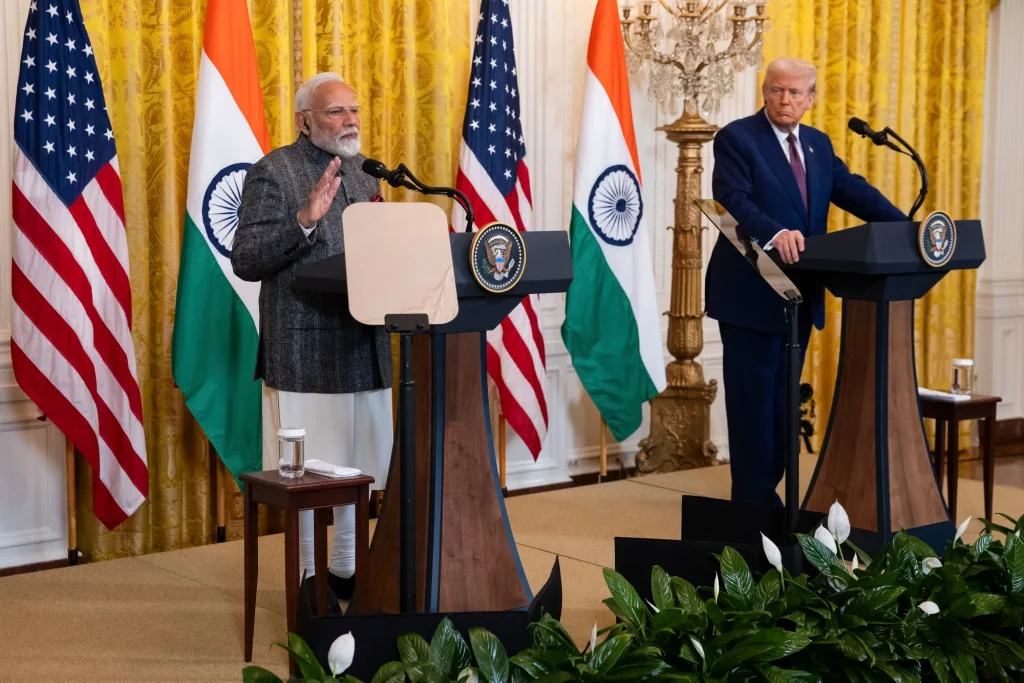U.S. Tariffs on Indian Goods Set to Take Effect Wednesday

Indian exporters are preparing for a significant drop in orders from the United States after trade negotiations broke down and Washington confirmed that new, sharply increased tariffs on Indian goods will take effect from Wednesday. The move marks a fresh escalation in tensions between the two strategic partners.
A 25% additional tariff, announced by President Donald Trump and detailed in a notice from the Department of Homeland Security, will raise total duties to as high as 50%—among the highest imposed by the U.S.—in response to India’s growing imports of Russian oil.
“The government has no hope for any immediate relief or delay in U.S. tariffs,”
said a commerce ministry official, who requested anonymity due to lack of authorisation to speak publicly.
The official noted that exporters affected by the new duties would be provided financial assistance and encouraged to shift focus to other markets like China, Latin America, and the Middle East. The commerce ministry has not yet issued a formal response to a request for comment on the latest developments.
According to the notice, the new tariffs will be implemented at 12:01 a.m. EDT on Wednesday (9:31 a.m. IST), with exceptions for shipments already in transit, humanitarian aid, and items under reciprocal trade arrangements.
The Indian rupee declined to a three-week closing low of 87.68 against the U.S. dollar, despite some recovery believed to be due to central bank intervention. Meanwhile, the key stock indexes both closed 1% lower, marking their worst performance in three months.
The decision on tariffs follows five unsuccessful rounds of negotiations. Indian officials had previously expressed confidence that the duties might be capped at 15%. However, both sides have attributed the breakdown to political missteps and missed signals. Trade between the two nations is valued at over $190 billion.
White House trade adviser Peter Navarro and U.S. Treasury Secretary Scott Bessent have accused India of indirectly supporting Russia’s war in Ukraine through increased oil imports. Bessent recently stated that India has been profiting from a sharp rise in Russian oil purchases, which now account for 42% of its total imports—up from less than 1% before the war. Washington has labeled this trend as unacceptable.
India has not issued any official instructions regarding Russian oil imports. According to three refinery sources, companies will continue to base their purchasing decisions on market conditions.
Industry groups estimate that nearly 55% of India’s $87 billion in merchandise exports to the U.S. could be impacted by the higher tariffs, potentially benefiting rival exporters in countries like Bangladesh, China, and Vietnam.
“The U.S. customers have already stopped new orders,” said Pankaj Chadha, president of the Engineering Exports Promotion Council. “With these additional tariffs, the exports could come down by 20% to 30% from September onward.”
Chadha said the government has committed to offering financial support, including increased subsidies on bank loans and assistance with market diversification, to help offset losses.
Private analysts caution that the continued application of a 50% tariff could hurt India’s economy and corporate profitability, possibly leading to the most significant earnings downgrades in the region—even if planned domestic tax reductions offer some relief. Last week, Capital Economics projected that full tariffs from the U.S. would reduce India’s economic growth by 0.8 percentage points in both the current and following year.
Foreign Minister S. Jaishankar stated that trade discussions are still ongoing and suggested that the U.S. stance on Russian oil imports has not been consistent, especially when compared to its treatment of other major importers like China and EU countries.
A U.S. embassy official in New Delhi said the United States remains committed to working with India to promote exports of high-quality goods and services that can contribute to India’s energy security and economic progress.
Prime Minister Narendra Modi has maintained that the government will not sacrifice the interests of Indian farmers, even at significant cost. He is also seeking to strengthen diplomatic ties with China, with plans underway for his first visit there in seven years at the end of this month.
